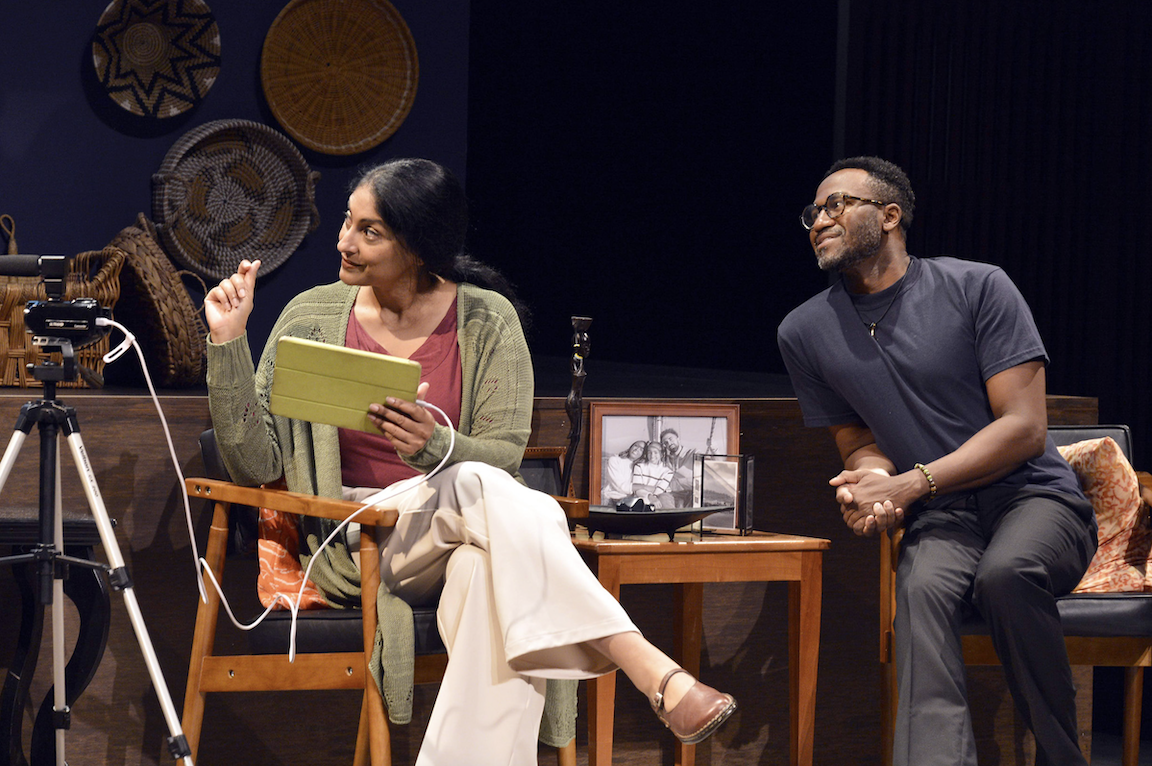Welcome to Theater News, a regular column by longtime reviewer Anita W. Harris. Look for it most Thursdays. Or sign up for our Eat See Do newsletter to get it in your inbox.
In Wendy Graf’s new play “Masala Dabba,” the mother of a 14-year-old girl is estranged from her own mother, who has just flown all the way from India — and has never met her granddaughter. Add an African American husband to the mix and the result is a family like a masala dabba, spices in a box, some of which blend together well while others carry a deep bitterness.
International City Theatre’s (ICT) world premiere production of the play, directed by Marya Mazor, brings the story to life on a warm and inviting set of the family home (designed by Destiny Manewal). Though some scenes are staged with less movement than seems natural, almost like tableaus, the simmering tension between mother and grandmother — and the four accomplished actors’ potent deliveries — rivet the audience through to the play’s meaningful conclusion.
Aditi (Nandini Minocha, bravely stepping into a last-minute casting change) wears a beautifully embroidered peacock-blue sari, skeptical of her son-in-law Charlie (Jon Joseph Gentry) as he points out Bay Area landmarks from the home’s back windows after she arrives early. We see she’s a bit critical and distant while he is warm and accommodating despite that.
When the coltish Tina (Timylle Adams) bounds in wearing a tennis dress and dumping her racquet and gear on the floor, she brings a much-needed breath of fresh air, openly questioning her grandmother about why she’s never met her.
Finally, Tina’s mother Nisha (Ansuya Nathan) arrives, awkward and cold around her own mother and strict with her daughter, with Charlie doing his best to mediate, leaning into his own cultural sensibility and respect for elders he’d learned from his grandmother who raised him.
As this dynamic plays out over the course of Aditi’s visit, we see the relationship between Tina and her grandmother blossom meaningfully through the sharing of clothing, jewelry and cooking even as Nisha’s awkwardness and pushing away of her mother only gets worse.
Tellingly, though Nisha is a cookbook author and host of a cooking show she films in her home, she has never tackled Indian cooking in either medium, though she learned it from Aditi as a child. The tension between the women comes to a head during a fluidly staged Indian dinner that Aditi and Tina prepare for Nisha and Charlie, where Nisha finally expresses her anger.
While mother and daughter dance around the reasons for their estrangement, nothing seems to answer what may be at its root. There is a connection to Aditi’s own beloved grandmother, who we eventually find out was also named Nisha, much to Nisha’s surprise, but it’s not clear why that love was not passed forward.
When Aditi starts telling stories, compelled by a worsening health condition, she reserves a final tale for Nisha’s ears alone that reveals a deep pain at the intersection of traditional culture, love and children, eventually leading to a satisfying conclusion.
The play has all the complexities of a short story, full of character and cultural details that make it as rich as Aditi’s embroidered sari. It’s also refreshing to see a play focused on people of Indian descent, a rarity here in Los Angeles, with the hints of African American familial nuances further enriching the story.

And all the actors do justice to their roles. Gentry is warm, smooth and often funny as Charlie, contrasting Nisha’s sharp awkwardness, which Nathan seems to play up. And Adams embodies the girlish Tina delightfully, infusing every scene she’s in with pluck and a joyful spirit.
As Aditi, Minocha is a perfect late addition to the cast, bringing an authoritative weight to her character while making believable the nurturing she shows Tina and the regret at what she’s shown Nisha. Though Minocha had to sometimes check the script during opening weekend due to an extremely short prep time, her resonant voice and emotionally inflected delivery did not seem like reading at all and will likely not be an issue for the remainder of the run.
One only wishes stage direction were a bit more energetic at times (also to compensate for the frequent scene breaks that sometimes disrupt flow and strangely come with a variety of music at different sound levels). When Nisha films Aditi’s stories, for instance, perhaps she could have been pacing rather than sitting to heighten the audience’s experience of her anxiety.
But these are minor quibbles. Overall, “Masala Dabba” is a gorgeous story with likeable characters finely portrayed by these four actors. Like Tina grappling with her mixed heritage or Nisha coming to terms with her mother’s legacy, the play reminds us that we all have complications. Even if they are as different as spices in a box, how they blend together is what makes us uniquely human.
International City Theatre’s “Masala Dabba” continues through Sept. 14 at the Beverly O’Neill Theater, 330 E. Seaside Way, with shows Thursdays through Saturdays at 7:30 p.m. and Sundays at 2 p.m. Tickets can be purchased by calling the box office at 562-436-4610 or visiting ICTLongBeach.org. Run time is 2 hours and 15 minutes, including intermission.

